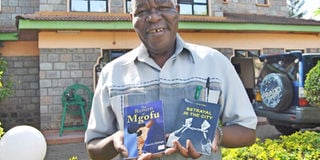Francis Imbuga story on show at National Archives

Prof Francis Imbuga, holds two of the books he wrote, during an interview at his Nairobi home on November 5, 2012. PHOTO | FILE | NATION MEDIA GROUP
What you need to know:
- His family has been planning to tell his story.
- On Monday, the Kenya National Archives will open its doors to the public, free of charge, for the Prof Francis Imbuga exhibition.
- The gallery is a package of his entire life, containing photos from as far back as his acting days, his young family, to those taken just before he died.
It has been six years since the demise of renowned playwright, author, actor, orator and academic Prof Francis Davis Imbuga.
In that period, his family has been planning to tell the story of how Imbuga, who went through life’s stages, slowly climbing to the highest echelons of academia to the time of his death on November 18, 2012.
On Monday, the Kenya National Archives will open its doors to the public, free of charge, for the Prof Francis Imbuga exhibition.
REMEMBERING IMBUGA
Dubbed “An Exhibition of Prof Francis Imbuga’s Literary Works”, the gallery is a package of his entire life, containing photos from as far back as his acting days, his young family, to those taken just before he died. Cut-outs of articles, satires and comic strips he wrote, including “Masharubu’s World” — a satirical column he was once the main contributor to in the Sunday Nation in the 1980s — will also be on display alongside his books and the notes he would jot down as ideas came to him for possible story plots.
An integral reason that had kept this gallery from taking place earlier was that the family was missing an Olympia Traveller DeLuxe portable typewriter and a Macintosh computer that Prof Imbuga used at the start of his career. Both could not be traced.
Then on September 6, 2018, Mr Gachoka King’ori reached out to Prof Mabel Imbuga on email, stating that he had the late professor’s typewriter.
“It is my pleasure to write to you and also a shame on my part that it has taken this long to get to talk to you … Some 24 years ago, he gave me part of his treasure — a portable manual typewriter — which I still own to date. With it I wrote dozens of TV and radio drama scripts for KBC TV and radio … with it I started writing my first novel, Divided Life, which was published early this year and which I have dedicated to my mentor.”
Doris Imbuga, the firstborn daughter to the Imbugas, says that although the idea of an exhibition had been discussed within the family, they had not given it much thought. The push to exhibit came from Gachoka and his intention to hand over the typewriter to the National Archives. They then agreed, as a family, that the idea fitted perfectly with theirs.
“Sometimes people see the finished book but not what goes into creating it; the numerous rejections and corrections done before you even present the work. His was a labour of love,” said Doris.
TALENTED
Prof Mabel Imbuga, his widow, asserts that he was world-renowned as Kenya’s best actor and playwright.
Prof Mabel, however, also remembers a husband who got her to appreciate books of literature, made her enjoy theatre and got her to be a people-person.
“He always had people over at our house and he would take me to every one of his plays when they were being staged at Kenya National Theatre,” says Prof Mabel.
Many people tell the family that they remember the fallen patriarch from having read his different setbooks or through the staging of plays he wrote.
His daughter, Louisa Imbuga, was the only one of his children who tried her hand in literature. Louisa, a pilot who loves art and reading novels, says her father wanted to nurture her artistic talent when he saw her interest in books and storytelling.
Mr Gachoka says his drive to have Prof Imbuga’s works presented to the public was because he was such a good writer who cannot be overshadowed.
“The content of his narratives were so powerful but told in a humorous manner. After the laughter, though, you would have the message at the back of your mind,” says Gachoka.
The exhibition will also go on in the auditorium, where the audience will watch plays that were either written or starred in by him, and even documentaries and other features.
Kenya National Archives will keep up the exhibitions until April 2019.





